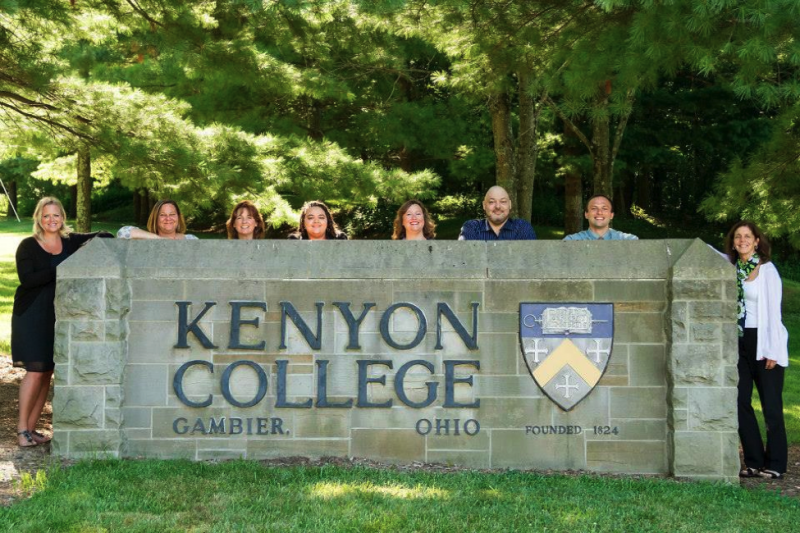Resources at Kenyon
While the Office of Admissions promotes the variety of support services available to students, I didn’t fully understand the ways these resources would benefit me until I was well into my first semester as a Kenyon student. After (almost) completing two years of schooling here, I now know that these resources are extremely valuable to the Kenyon community. Even though this list is not exhaustive, here are a few of the most important campus resources.
Career/Internship/Graduate School Assistance:
Career Development Office (CDO)

The CDO was one of the first offices I visited when I moved into Kenyon as a first-year. I thought it would be a good place to get to know, and my instincts were spot-on. The staff members are happy to help you in any way they can, and this eagerness shows through the numerous resources they provide. When you first walk in, you’ll see pamphlets that describe everything from how to write a cover letter to what to wear to an interview — and that’s only the information they set out! If you schedule an appointment, a staff member can help you:
• Connect with alumni in your field via the Kenyon Career Network
• Find internships
• Improve your resume
• Write a cover letter
• Set up a job shadow
• Develop your interviewing skills
• Apply to a job on campus
• Find a career after you graduate
• Apply to graduate school
Student Support Groups:
Peer Counselors (PCs)
The PCs are a group of students who work closely with the Counseling Center to promote students’ mental health and well-being. They provide a 24-hour hotline (740-398-3806) that students can call for peer counseling; offer office hours; and lead small-group, informal discussions on body image, depression, anxiety, isolation, meditation/tea and sexual assault. While I haven’t called the PC hotline or been to a small-group discussion myself, it is reassuring to know that the PCs are available to talk to me if I need them.
Sexual Misconduct Advisors (SMAs)
The SMAs are similar to the PCs in that they are a group of students and staff members; however, their purpose is specifically to promote respectful and consensual sexual relationships at Kenyon. SMAs receive training to respond to students who experience sexual misconduct. These responses may include informing survivors about policies relating to sexual assault, connecting them to resources, or simply listening to survivors; it depends on the type of assistance the survivor wants. Contacts are kept confidential, and students can reach the SMAs at their hotline (740-358-1544).
Diversity Resources:
Office of Diversity, Equity and Inclusion (ODEI)
 The ODEI offers several key services that are important to the Kenyon community. The office supervises multiple groups that strive to establish “a more diverse, open, inclusive, accepting, equitable and affirming campus environment.” Two of the ways they do this are by overseeing the Discrimination Advisors (DAs) and running the Summer Internship Stipend Fund (SISF).
The ODEI offers several key services that are important to the Kenyon community. The office supervises multiple groups that strive to establish “a more diverse, open, inclusive, accepting, equitable and affirming campus environment.” Two of the ways they do this are by overseeing the Discrimination Advisors (DAs) and running the Summer Internship Stipend Fund (SISF).
The DAs are a group of students, faculty and staff who are trained to informally help students who experience group-based discriminatory harassment. They strive to challenge all forms of discrimination on campus by holding open office hours, hosting relevant programming, responding to incidents of discrimination and attending trainings. They are another great student support group; however, DAs do not have confidentiality in Title IX cases like PCs and SMAs do.
The SISF is a fund that was created in 2014 to allow students who qualify for need-based financial aid to accept unpaid summer internships. Students can apply to receive stipends that range from $1,000 to $5,000 to help cover the costs of food, travel, housing and professional attire. As a student receiving financial need who wants to work in the nonprofit field (a field in which summer internships are rarely paid opportunities), I am very glad that this resource exists. I will be interning this summer at New Directions Domestic Abuse Shelter and the Knox County Prosecutor’s Office — both of which are unpaid internships — and I have applied to the SISF to help cover the costs of commuting to Mount Vernon from my hometown in Knox County. It is encouraging to know that Kenyon is willing to provide financial support for students in similar situations.
Another title for this post could have been “Kenyon Acronyms You Should Know” because these resources are used by students so often that they occupy a permanent place in our Kenyon lingo (and show how much our campus loves acronyms). Every student knows who the PCs are, what the CDO is and how to contact the DAs, and if you want to understand the Kenyon community, you should know them, too.
